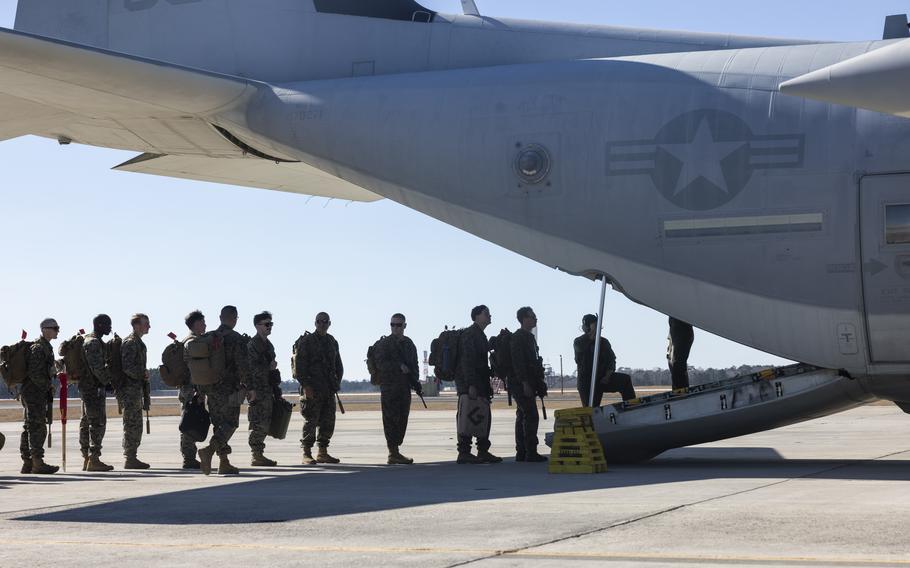
U.S. Marines with 1st Battalion, 6th Marine Regiment, 2d Marine Division board a C-130 Hercules on Marine Corps Air Station New River, N.C., on Feb. 1, 2025. The Marines are deploying to Naval Station Guantanamo Bay. (Alexandria Serrano/U.S. Marine Corps)
Ten suspected Venezuelan gang members were among the first to arrive Tuesday at Naval Base Guantanamo Bay as about 300 U.S. troops worked to expand the center’s migrant capacity to hold thousands more deported migrants.
The 10 “high-threat” individuals are associated with the Tren de Aragua, a transnational criminal street gang, White House Press Secretary Karoline Leavitt said Wednesday.
The flights departed from El Paso, Texas.
“Americans are safer every single day one of these criminals is arrested and deported from our country,” Leavitt said.
The migrants are temporarily being housed in vacant detention facilities at the base in Cuba, the Department of Defense said. They will eventually be transported to their country of origin. According to Leavitt, Venezuela has agreed to accept the return of Tren de Aragua gang members.
The migrants arrived at Guantanamo Bay as more than 300 sailors, soldiers and Marines worked alongside Department of Homeland Security forces to expand the facility’s capacity to hold 2,000 migrants.
Additional expansion phases are planned, according to U.S. Southern Command, the combatant command that oversees military operations in the region.
The Navy base has been used primarily for the last two decades to detain those associated with the 9/11 attacks. President Donald Trump has said the base has the capacity to hold as many as 30,000 migrants.
Wednesday, Leavitt said Mexico’s President Claudia Sheinbaum agreed to supply 10,000 soldiers on the U.S.-Mexico border. Those soldiers, Leavitt said, will be tasked with preventing fentanyl and illegal migrants from “pouring into our country.”
Additionally, El Salvador has agreed to book in Salvadorian prisons illegal migrants of any nationality who are slated for deportation from the U.S. The agreement, Leavitt said, is “unprecedented.”
“Efforts to seal the border, halt the invasion and carry out the largest mass deportation campaign continue at lightning speed,” she said.
To date, Leavitt said more than 8,000 migrants have been arrested since Jan. 20, when Trump took office. Of those, 461 have been released for various reasons, including medical conditions and lack of detention facilities.